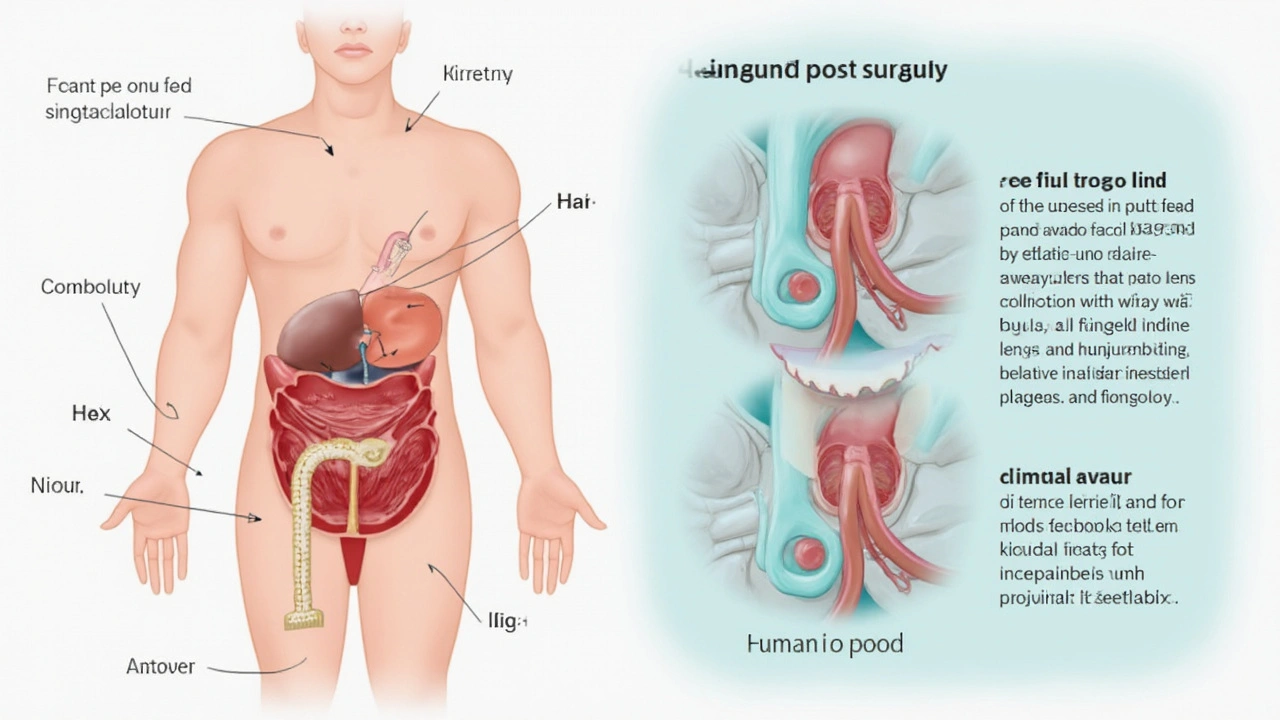Difficulty Urinating After Surgery: Understanding and Managing the Challenge
 Feb, 11 2025
Feb, 11 2025
Finding yourself unable to urinate easily after surgery isn’t just uncomfortable—it can be downright frustrating. If you’re dealing with this post-surgery hiccup, you’re not alone. Let’s dive into what might be causing this, and more importantly, what you can do about it.
Surgery often leaves our bodies a bit confused. Anesthesia, pain medications, or the surgery itself might play tricks on your bladder’s usual routine. Sounds familiar? It happens to a lot of people! But there’s no need to panic. Most often, it’s just your body’s temporary reaction.
If you’ve got a feeling of fullness, but things are just not flowing, there are a few practical tips to try right at home. Sitting up straight instead of lying down, running warm water, or even hearing water trickle can sometimes help jumpstart the process. I know it sounds odd, but it can work like magic!
It’s also crucial to keep an eye on how long this issue lingers. If you find yourself in discomfort or things aren’t improving, don’t hesitate. Calling your healthcare provider might be the best step to take. You should never feel shy about seeking help when it comes to your health.
- Understanding the Causes
- Practical Tips for Easier Urination
- When to Seek Medical Help
- Long-term Management and Prevention
Understanding the Causes
It’s not uncommon to wonder why exactly you’re having difficulty urinating after surgery. Turns out, there are quite a few reasons this could be happening, and understanding these can make the whole process a bit less mysterious.
Anesthesia's Impact
First up, let’s talk about anesthesia. Anesthesia, used during surgery, doesn’t just put you to sleep. It also affects your bladder’s ability to contract. Think of it as the bladder getting a bit drowsy and not working at full capacity. Once the drugs are out of your system, your bladder should start waking up too.
Pain Medications
Then, there are pain medications. They’re a lifesaver for post-surgery pain, right? But some, especially opioids, can slow things down in your body, including your bladder. If you’re on these meds, it might be worth chatting with your doctor about alternatives if you’re having trouble.
Surgery Type and Location
The type of surgery you’ve had also plays a big role. Abdominal or pelvic surgeries can temporarily change the way your bladder functions just because of where they’re located. Sometimes, the bladder's nerves and muscles aren’t quite sure what to do after having been nudged around during surgery.
Emotional and Physical Stress
Finally, we can’t ignore stress—both emotional and physical. Surgery is a big deal for your body and mind. The stress involved can sometimes make relaxing your muscles, including those in your bladder, a bit tricky.
While this can feel frustrating, remember that it’s usually temporary. Understanding the 'why' can ease your mind and help you approach each day with a bit more patience. Stay in touch with your healthcare provider—their insights can offer you additional tips specific to your situation.
Practical Tips for Easier Urination
Having a hard time with urination after surgery is something that many folks experience, but there are some tried-and-tested tricks to help ease this process. Here’s how you can encourage things to flow better:
Sit Upright and Relax
Sitting up straight on the toilet rather than lying down can actually help. This position uses gravity to your advantage, aiding your bladder to empty more naturally. Relaxation is key, so take long, deep breaths to calm your body and your nerves. Sometimes tension can hold things up!
Use the Sound of Running Water
This might sound like an old wives' tale, but letting the tap run can sometimes trigger the bladder to start working. The sound of water can create a psychological response, prompting urination. If you need to, play some gentle water sounds on your phone or a nearby device.
Stay Hydrated But Not Too Much
It might seem counterintuitive, but drinking small sips of water rather than gulping large amounts can help. Staying hydrated aids your bladder's function, but flooding your system too quickly can cause discomfort.
Try Gentle Heating
Placing a warm compress or heating pad on your lower abdomen for a few minutes can often help relax muscles. This can signal your bladder to release. Remember, it should be warm, not hot—safety first!
Bladder Training
In some cases, gently trying to go every couple of hours can help train your bladder to empty regularly. It’s important not to strain or push hard, just give your body a chance to respond naturally.
| Tip | Effectiveness Rating |
|---|---|
| Sit Upright and Relax | High |
| Use the Sound of Running Water | Moderate |
| Stay Hydrated | High |
| Try Gentle Heating | Moderate |
| Bladder Training | Moderate |
Implement these tips and see what works for you. It’s worth giving each a shot to find which one suits your body best. Just remember, patience is key. And if all else fails, reach out to your healthcare provider to make sure everything is on track.

When to Seek Medical Help
So, you’ve tried a few tricks, but the difficulty urinating just won’t budge. When is it time to call in the experts? Knowing when to reach out for medical assistance can save you from potential complications and give you peace of mind.
Your body often needs a bit of time to bounce back after surgery, but certain signs should not be ignored. If you haven’t urinated at all within 6 to 8 hours post-surgery, it's time to contact your doctor. This is especially crucial if you’re feeling pain or discomfort in your lower abdomen. You don’t want to let it linger and make things worse.
Signs of Trouble
- Severe pain or swelling in the lower abdomen.
- Bladder feels full but you can’t urinate.
- Experiencing fever or chills might hint at an infection.
- Any cloudy or foul-smelling urine can be a red flag.
And here's something to keep in mind: if your issue persists or recurs frequently, a more in-depth examination might be necessary. Urinary retention sometimes indicates other underlying conditions that need attention.
Why It Matters
Neglecting urinary issues can lead to bladder infections or even kidney damage if not addressed promptly. Your healthcare provider might suggest a simple exam or even an ultrasound to understand what's happening under the surface.
While some folks might get anxious about overreacting, remember, it's always better to err on the side of caution when it comes to your health. Addressing urinary issues promptly could prevent bigger problems down the road.
Long-term Management and Prevention
It’s essential to think about long-term management when you've experienced difficulty urinating after surgery. Learning how to manage it can help prevent future issues and keep your urinary system healthy.
Know Your Triggers
Understanding what might trigger these urinary difficulties can be your first line of defense. Often, medications, dehydration, or certain foods might be culprits. Tracking when and what you consume versus when you face urination challenges can be enlightening.
Try keeping a journal. Every time you notice difficulties, jot down what you ate, drank, or what medications you were taking. It’s a simple step with the potential for big payoffs.
Regular Check-Ups
Regular check-ups with your healthcare provider can detect issues early on. Don't wait for symptoms to pile up before you seek help. And remember, symptoms that disrupt your daily life warrant a professional's attention.
Dr. Emily Nguyen, a specialist in urology, advises, "Regular monitoring and open discussions with your healthcare team can greatly reduce the risk of recurrent urinary problems post-surgery."
Stay Hydrated
Water is your friend. Drinking enough fluids helps keep the bladder working smoothly. Aim for about 8 glasses a day unless advised otherwise by your doctor. If you’re more active or live in a hot climate, you might need more.
Pelvic Floor Exercises
Strengthening your pelvic floor can also make a significant difference. Exercises like Kegels, which involve repeatedly contracting and relaxing the muscles used to stop urinating, can improve control and function.
Here’s how you can do Kegels effectively:
- Find the right muscles: Identify the muscles you use to stop urination.
- Contract and hold: Squeeze these muscles for 3-5 seconds.
- Relax: Let the muscles go for the same amount of time.
- Repeat: Aim for 10 to 15 repetitions, three times a day.
These exercises can be a game-changer if done consistently.
| Hydration Level | Recommended Daily Intake (Liters) |
|---|---|
| Regular Activity | 2.7 |
| Active Lifestyle | 3.7 |
Remember, you’re not alone on this journey. Many have walked a similar path and found relief through understanding and proactive management. Keep these strategies in your toolkit, and you’ll be well on your way to keeping those urinary concerns at bay.

Curtis Ryan
February 13, 2025 AT 06:29Rajiv Vyas
February 14, 2025 AT 20:01farhiya jama
February 16, 2025 AT 01:40Astro Service
February 16, 2025 AT 11:12DENIS GOLD
February 18, 2025 AT 03:14Ifeoma Ezeokoli
February 18, 2025 AT 14:22Daniel Rod
February 19, 2025 AT 16:44gina rodriguez
February 20, 2025 AT 07:55Sue Barnes
February 21, 2025 AT 04:37jobin joshua
February 21, 2025 AT 21:44Sachin Agnihotri
February 22, 2025 AT 15:21Diana Askew
February 22, 2025 AT 16:11King Property
February 23, 2025 AT 09:31Yash Hemrajani
February 23, 2025 AT 23:13Pawittar Singh
February 25, 2025 AT 00:26Josh Evans
February 25, 2025 AT 16:55Allison Reed
February 27, 2025 AT 09:32Jacob Keil
March 1, 2025 AT 07:25Rosy Wilkens
March 2, 2025 AT 12:22